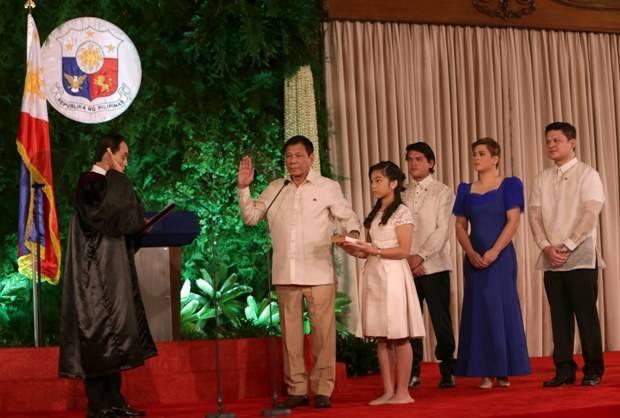
Transparency International has long described the Philippines as among the more corrupt nations on earth, one of many reasons why the country’s biggest export has long been its people, who work abroad from the U.S. to the Middle East. But never mind that.
Over the weekend, U.S. President Trump invited the Philippines’ president, Rodrigo Duterte, to the White House -- a move that stunned human rights advocates, as well as the U.S. government agencies that are usually contacted about such state visits in advance.
The invitation, which was soon followed by a Bloomberg interview during which Trump said he would be “honored” to meet North Korean dictator Kim Jong Un, ensures that the next 100 days of this administration will be as much of a roller coaster as the first – with most polls suggesting that only about 40 percent of U.S. citizens are enjoying the ride.
Trump’s latest diplomatic foray raises even more eyebrows, since Duterte’s invitation was made in the name of seeking “cooperation” in the region to address rising tensions with North Korea, White House Chief of Staff Reince Priebus told ABC's "This Week."
At a time when more businesses are pledging more transparency about everything from their political donations to their sourcing policies, Trump’s invitation raises even more alarm bells about his family business.
One of the president’s business partners, Jose E.B. Antonio, constructed a $150 million Trump-branded office building in the Philippines’ capital, Manila. And last fall Duterte named Antonio as a special envoy to the U.S.
The complex offers $750,000 one-bedroom apartments with stellar views in a nation where per-capita income is just below $3,000 annually. It prominently featured Trump’s daughter and White House advisor Ivanka Trump in branding – though those articles have since been scrubbed from the Manila building’s website.
As is the case with other Trump-branded ventures, from India to Brazil, the deal raises questions about whether his companies will score favors from local and national leaders not afforded to other businesses. In Turkey, for example, President Recep Tayyip Erdogan demanded several times that the Trump name be removed from a high-rise office complex in Istanbul -- including again after his first travel ban in January. But he has since had a change in tone. The Trump Towers project in Istanbul still brandishes the president’s name.
But Trump’s deals in the Philippines raise questions beyond shady business dealings and allegations of special favors or tweaks in policies. Since Duterte ascended to the Philippines’ presidency last summer, Amnesty International and other human rights organizations have linkd his anti-drug crusade to the murders of at least 7,000 citizens.
Amnesty International says Duterte’s “war on drugs" has largely been waged against the country’s poor. Accounts include the hiring of vigilante killers, as well as the planting of evidence in order to incriminate suspects. The behavior of many unrestrained police forces, whose the tactics resemble those of Islamic State more than responsible law enforcement, stirred condemnation both from within the Philippines and across the world.
The outcry reached a point at which the nation’s top law enforcement official said that he would cease police officers’ participation in this drug war earlier this year, but Duterte insists that his policies will continue.
Duterte’s policies have not been designed to convince more Filipinos to stay; at last count, the country’s government estimated that 2.4 million of its people were working abroad, in sectors as diverse as medicine, retail, real estate development and tourism. Though those latest figures are from 2015, before Duterte took office, media reports suggest overseas workers wire home almost $27 billion in remittances a year, or 8.5 percent of the Philippines’ gross domestic product. With those remittances in mind, Duterte has not put forth any policies to encourage Filipinos to return home and invest; instead, he suggested establishing a government agency that would meet the needs of those overseas workers – and ensure those funds would continue to be wired from abroad.
But Duterte has succeeded in landing a coveted invitation to Washington D.C., and potentially Mar-a-Lago, from the current U.S. president, who is reportedly still keeping close tabs on his own business ventures. Instead of working to make his country a safer haven in which to invest and boost jobs nationally, Duterte has engaged on a cynical policy that comes at the expense of many of his fellow citizens’ lives.
Trump’s call to Duterte comes only a few days after he described the U.S. Constitution as “archaic” – suggesting he is looking for tips on running a government from Duterte, who has been able to suppress dissent due to his supermajority in the country’s Congress.
Image credit: Government of the Philippines

Leon Kaye has written for 3p since 2010 and become executive editor in 2018. His previous work includes writing for the Guardian as well as other online and print publications. In addition, he's worked in sales executive roles within technology and financial research companies, as well as for a public relations firm, for which he consulted with one of the globe’s leading sustainability initiatives. Currently living in Central California, he’s traveled to 70-plus countries and has lived and worked in South Korea, the United Arab Emirates and Uruguay.
Leon’s an alum of Fresno State, the University of Maryland, Baltimore County and the University of Southern California's Marshall Business School. He enjoys traveling abroad as well as exploring California’s Central Coast and the Sierra Nevadas.














